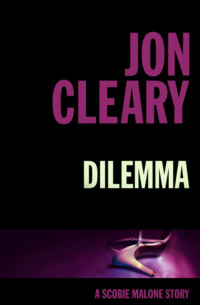
Полная версия
Back of Sunset

JON CLEARY
Back of Sunset

Dedication
To the
ROYAL FLYING DOCTOR SERVICE OF AUSTRALIA
its doctors, nurses, pilots and radio operators
Contents
Cover
Title Page
Dedication
Chapter 1
Chapter 2
Chapter 3
Chapter 4
Chapter 5
Chapter 6
Chapter 7
Chapter 8
Chapter 9
Chapter 10
Chapter 11
Chapter 12
Chapter 13
Chapter 14
Keep Reading
Acknowledgements
About the Author
Also by the Author
Copyright
About the Publisher
Chapter 1
“There goes the Iberia,” Rona said. “Lucky devils, all those people on it.”
“They’re heading for an English winter.” Stephen McCabe lay flat on his back on the sand, his eyes shut against the glare of the October sun.
“There’s more to life than climate,” Rona said, sitting up and staring out at the big white liner as it moved slowly down the harbour.
“Is that an advertising slogan? Maybe the British Travel Whatever-it-is could use it.”
“I wish you would be serious occasionally,” Rona said, still gazing out at the ship. “You can be so fantastically annoying at times.”
Stephen didn’t open his eyes, but he knew the slight frown that would pass across Rona’s face as she spoke. He knew every expression that accompanied every inflection of her voice; I know her too damn’ well, he thought, and knew what a burden knowledge could sometimes be.
Rona Goodyear was twenty-two and beautiful enough to take her looks for granted; she needed no more reassurance than the honesty of her own mirror could give her. She had no conceit at all about her beauty; it was one of the points Stephen liked most about her. She had thick auburn hair, cut short, green eyes and the bonework in her face was almost fragile: it was the sort of face on which suffering, if ever she had to bear it, would show plainly and ugly, like a scar. She had the sort of complexion that went with red hair and green eyes, pale and smooth as snow; her complexion had the impermanent look that snow had and you felt it was too perfect to last. Each time she came here to the pool, or went riding with Stephen in the open Jaguar, she smothered herself in cream and wore dark glasses. Now, too, she wore a large straw hat that, made originally for a peasant in some Malayan rice paddy, was now high fashion on Sydney beaches.
Stephen had opened his eyes and was watching her. “You’ll look even better in England. No sun to worry about.”
“I know,” said Rona, smiling at him from under the shade of the big hat, her eyes blind behind the dark glasses and the smile only on her lips. “It’ll be absolutely wonderful not to have to worry about freckling.”
“I don’t think I’ll look so hot without a tan. I’m not the pale type.”
“Darling, the girls in London will fall all over you, with or without your tan.”
“Still, when I’m lying in some Mayfair boudoir, all skinny and white, I’m going to miss all this.” He moved his head, taking in all the pool. “There’s something in my blood that needs sun. I’m a King’s Cross Neapolitan.”
He stood up, brushing the sand from his trunks and body. He was tall, over six feet, and his height made him seem thinner than he actually was. His physique was the type that never carried much surplus weight; when he was old, if he lived so long and sometimes he doubted it, he would have the thin look he associated with ancient greyhounds or Tibetan seers. His face, too, was lean and long, with the bones very prominent, as if the skin were stretched too tightly over it; they were strong bones and gave a look of strength to his face that was not always apparent in the set of the mouth, nose and eyes. His eyes were dark blue, almost black, a trifle saturnine but not without kindliness; they looked tired now and a little worried. His hand rested for a moment on the long scar on the outside of his thigh; it was the relic of the one time in his life when he had been in real danger, when he was fourteen and a shark had made a pass at him while he swam one dusk in the surf at Coogee. He was in no danger now, but the scar was a reminder of the past, and in the last few weeks the past had been coming back to him, sweetly painful at times like a grief that had not been an utter loss.
“I’m going to miss all this,” he said again, and suddenly sounded irritable, almost afraid.
“You won’t miss it,” Rona said. “Not really, darling. Not when we’ve got everything we want in London.”
“No,” he said, and looked about him again. “I had to work my way up to all this. I’ve got used to it.”
Redleaf Pool basked in the quiet of Friday morning. On the hill behind it, hidden by the trees and the houses, trams and cars went by in a rush: now and again there was the yelp of a horn or the scream of brakes, like the cries of animals trapped in a circus whose main ring was New South Head Road. There were no more than fifty people in the pool enclosure; these were the lucky ones, the well-to-do, the pensioners and the unemployed. Young mothers in bright swim-suits sat on the sand exchanging gossip, one eye on each other and the other on their children making a white cream of the water’s edge. Some old men, wrinkled brown flesh bulging above trunks as vivid as native lap-laps, sat in a row, soaking up what each knew could be the sun of his last summer. Four New Australians, pale as waiters, approached the water warily; beside them the children giggled at their fear and rushed at the water in a flurry of bravado. Some young girls, lazy with sun and the awareness that their doting parents didn’t require them to work, lay stretched on the sand like novice whores; the pool attendant, young and poor and required to work, turned his back on what he couldn’t afford and spat spitefully at a seagull. On either side of the pool, along Seven Shillings Beach and round the point to Double Bay, expensive homes and apartment buildings crowded the hill: in some places the apartment buildings overhung the water’s edge, glinting in the sun like glass-fronted cliffs: a woman sunned herself on a tiny balcony like a gull on a ledge. Up on Point Piper Stephen could see the homes of the wealthy, big ugly homes huddled together like reclaimed tenements. Rona lived up there with her parents in a Tudor-style mansion that would have made any self-respecting Tudor welcome the block. Residents of Point Piper had contributed little to the architectural beauty of Sydney: the original builders had little if any taste, and the later arrivals had been concerned only with the address. The Goodyears had been among the later arrivals.
“In London I’ll have to start all over again,” Stephen said. “I don’t mean I’m going to miss just the sun and the swimming.”
“What do you mean then, for heaven’s sake?”
Stephen considered replying for a moment, then he shrugged and let it go. He was too tired for explanations, and for the argument that would probably follow; if Rona didn’t understand by now what he meant, then she never would. It was the difference between ambition, which was her cross, and a desire for security, which was his.
“Sometimes you can be so fantastically annoying.” Rona had gone to one of the most expensive and fashionable schools in Sydney: its pupils were recognisable by their complete unawareness of any but the most extravagant adjectives. “I don’t know how your patients can stand you at times.”
“I’m tired, that’s all,” he said, but he knew it wasn’t all. “I haven’t been to bed before two o’clock any morning this week. I’ll be glad when you’re on the plane for New Zealand on Monday. I’ll spend the next month catching up on my sleep.”
“Darling.” There was real concern in Rona’s voice. She could change abruptly like this, from a spoiled self-centred girl to one who was aware that all was not right in the world of others. She did voluntary hospital visiting, and some evenings Stephen had seen her burst into tears at the memory of some poor unfortunate she had visited in the afternoon. It was one of the things that gave hope for her in Stephen’s mind; one of the things that helped reduce the slight shame he felt in finding excuses for her occasional demanding behaviour. She looked at him with love. “You’re working too hard.”
Ah, that’s spoiled it, Stephen thought: she has completely overlooked that she’s had me playing it too hard, too. “Maybe I need a holiday.”
“Come to New Zealand with Mummy and me.” Mrs. Goodyear had come from Auckland twenty-five years before, an ambitious nurse who had chosen an easier and more profitable career and married a rising young doctor; now she went home each year to the hostile indifference of her relatives, the local girl who had made good and who now talked of Sydney as home, something the Aucklanders couldn’t forgive. “We shan’t have to spend all our time with the ghastly relations.”
Stephen shook his head. “I couldn’t take it.” He bent down and picked up his towel. “I’ll see you tonight at Palm Beach. I’ll be at St. Vincent’s all afternoon.”
He bent again and kissed her: she tasted of cream, bitter as aloes. “Darling, why don’t you give up some of your hospital appointments? You have enough to do in the practice.”
Here we go again, he thought; but he was too tired to argue. “I’ll think about it. See you tonight.”
“I’ll miss you.” Rona did love him: she was sincere enough about that. “I wish you were rich enough so we could both be parasites. Never separated, not even for an hour.”
He grinned, and pressed the scarlet-tipped fingers she held up to him. Then he left her and walked along the sand and up the steps to the dressing-rooms. Rona watched him go, loving him but irritated by him: he was nine years older than she was, but sometimes she felt he was as irresponsible as a child. No, perhaps not irresponsible; unambitious, that was more like it. And perhaps even that didn’t describe him. He had been ambitious enough when he had joined her father in the practice; or so her father had told her. She had been still at school then, although her own ambition had already begun to blossom even in the confines of the classroom and the dormitory: she had never been a good student, but she had seen no limit to the future: she had failed in Maths Two, in History, in Science, but at fifteen she had been one of the most brilliant snobs the school had ever turned out. Socially, the school knew its reputation would be safe with her.
No, it was not that Stephen was unambitious. It was rather that he was too insular in his ambition. It was the trouble with most Australians; she was never sure whether it was fear or smugness that made them satisfied with their own horizon. She and Stephen had discussed this, had argued about it, every week now for the past six months; and it had slowly dawned on her that it was going to be more difficult than she had realised to achieve her ambition. Her ambition, formed a long time ago, was to be the wife of a successful London surgeon, a Fellow of the Royal College of Surgeons, a Harley Street name, perhaps even a consultant to the Royal Family. It had been purely fortuitous that the man most likely to help her succeed in her ambition was her father’s junior partner. It had been almost coincidental that she had fallen in love with him at the same time as she had nominated him as her means to her end.
And now Stephen, like a man who had suddenly looked up at the height of the tower from which he had boasted he would dive, had become cautious. Or afraid.
“Darling,” Rona said, seeing him disappear into the dressing-rooms, and something like tears, of pity, for Stephen or herself, she wasn’t sure which, welled behind the dark glasses. Too few people liked Rona, and she had only herself to blame: her heart was hidden behind dark glasses, as if the better emotions were something of which to be ashamed.
II
Stephen miraculously found a parking place right outside the building in Macquarie Street where he and Charles Goodyear had their rooms. He dexterously swung the Jaguar convertible into the space, and switched off the engine. Maybe this was going to be a good day after all: he was superstitious of such small portents: his life was signposted by doors opened at the right moment, letters of resignation mislaid and not posted in time, tax rebates arriving unexpectedly in the mail. He looked up at the sky: it was cloudless, another good sign. Then he wondered why he had been expecting a bad day, and could find no answer. His only conclusion was that over the past few months he must have begun to turn into a pessimist.
He ran a comb through his long dark hair, straightened his tie, then, carrying his hat, got out of the car and crossed to the front steps of the building. He had begun wearing a hat only in the last six months: preparing for England, he had remarked to Charles Goodyear; but he was still not used to it and he wore it on his hand as much as on his head. He wore a cream silk shirt, a blue silk knitted tie, a blue flannel suit and brown suede shoes; and he had enough vanity to think that he looked elegant and well-dressed. His father, who for years had worn the same old cardigan, whether reading alone, entertaining friends, or seeing patients in his surgery or on his rounds, would have laughed at the suggestion that a doctor’s dress could count as much as his potential ability. Yet Stephen knew it was so. Australians, who had once liked to boast of their being a pioneer nation, had graduated to the snobbery of dress. The men in Macquarie Street, with the exception of the politicians in Parliament House across the road, were as well dressed as the men in Harley Street and Park Avenue.
Stephen and Goodyear had a suite of rooms on the eighth floor: a waiting-room, a small office and a room for each of the doctors. It was possible to enter the office from the corridor without going through the waiting-room: Goodyear had arranged it this way because, as he said, he had got to the age where there was something frightening about seeing patients en masse, even at three guineas a head. Miss Watkins, the secretary, and Miss Mack, the nurse, were in the office when Stephen entered.
They both looked up and smiled: they were always pleased to see him, even if he was already another woman’s property.
“Mrs. Hector had to cancel her appointment,” said Miss Watkins, perfectly composed but the derisive laughter there behind the dark-eyed good-looking face: “Her husband is due back from abroad tomorrow. She has to have her hair done.”
“The hairdresser will probably do her as much good as I could,” Stephen said, and despised himself. There was nothing very much wrong with Mrs. Hector, but he should not have joined in the joke with Miss Watkins: the patients, no matter how spurious their ills, paid for his loyalty.
Miss Mack said nothing, but she didn’t need to: her square plain face was as expressive as a roomful of eyes. “Mrs. Crepello is in with Mr. Good-year,” she said, in the soft pleasant voice that went so oddly with the blunt face and the aggressive walk. “You have no other appointment till noon. Unless you’d like to see the man waiting outside, a Mr. Tristram. Although he asked for Mr. Goodyear.”
“Let Mr. Goodyear have him,” Stephen said.
Then an inner door opened and Mrs. Crepello was ushered out by Charles Goodyear. Mrs. Crepello was a stout woman, a bulging faille sack held together by ropes of pearls; a strict diet and a few strong words from Goodyear would have cured her condition, but she was not the sort of woman to accept either stricture. She needed a doctor in attendance now as much as she had needed an escort in her younger days: sympathy had replaced flattery and was as necessary to her as breathing. It was worth a hundred guineas a year to her to be told she had angina pectoris.
Her small self-sympathising voice fluted round the room; she made a donation to Stephen of her fat be-ringed fingers.
“Dr. McCabe, why can’t I have you attend me? Why must I get an old fogy like Charles here?”
The old fogy somehow managed a gallant smile; Goodyear had learned to act as well as he could operate. “Dr. McCabe has to. wait his turn for the interesting cases. I had to wait for mine.”
Miss Mack turned away and went into Goodyear’s room; to Stephen her walk had the aggressiveness of a disgusted Spartan. Miss Watkins remained at her desk, offering a painted smile: she could use lipstick more cleverly than any girl Stephen had ever met: a slight movement of the painted, rather full lips, and Miss Watkins could offer sympathy, interest, encouragement, at the same time as she made out the accounts and checked the appointments for next month. She is untouchable, Stephen thought, looking at her now, and what an asset that is in this game.
Mrs. Crepello left on a wave of perfume, her fluttering hand trailed behind her like a diamond-encrusted pennant; she was talking as she went out the door, leaving words behind her to be picked up as soon as she re-entered the room next month. She talked without caring if anyone was listening, as if the sound of her own voice was another of the encouragements she needed.
Stephen followed Goodyear into the latter’s room, standing aside to allow Miss Mack to pass out, then closing the door behind her.
“That fat old bag,” Stephen said.
“Miss Mack?” said Goodyear, smiling slightly.
“You know who I mean. To think she’s part of our bread and butter.”
Goodyear shook his head. “No, Stephen. Mrs. Crepello is part of our cakes and cream. When did you last eat just bread and butter?”
Stephen dropped into one of the purple-tweeded lounge chairs. Rona had a talent for colour and decoration, and last year she had completely redecorated the suite of rooms. She had solved the trick of combining the clinical and the personal: patients felt they were welcome here, but bacilli made straight for the windows. The windows were wide and deep and looked out across the Botanical Gardens to the harbour. A patient could sit here and admire the view, one of the best in the world, while Charles Goodyear, in his flat dry voice, told him he had only six months to live. If the patient, the pain perhaps a little sharper inside him now, craned forward he might be lucky enough to see the Governor strolling in the grounds of Governmént House; a turn of his head to the right and he might see the politicians coming down the steps of Parliament House, their faces dark with something that could be honest thought or the pain of corruption. Stephen, standing at the windows one bright crystalline day, watching the yachts like slow-flying birds on the sun-freckled water, had remarked that there were many worse places where one could receive the sentence of death. Goodyear, who that morning had seen two doomed patients, had however remained silent. Successful, pickled slightly with cynicism, he was still capable of twinges of conscience when he looked about the brightly sumptuous room.
“You sound as cynical as Rona sometimes,” Stephen said now.
“Not quite.” Again Goodyear shook his head; all his negatives and affirmatives were underlined by a movement of his head. “Rona is much more ambitious than I ever was. She needs more cynicism than I did – too much, I sometimes think, for a young girl. She gets it from her mother – the ambition, I mean.”
“How did you combat it?”
“I didn’t.” Goodyear waved a hand round the room, at the expensive furniture, the wall-to-wall carpet so deep that it could reduce even the thump of a fainting body to no more than a soft thud, the Dufy watercolour on one wall and the Dobell portrait of Goodyear himself on the opposite wall; he looked at it all without possessiveness, like a consort in the domain his queen had planned for him. “This is what Peggy wanted for me. Here I am.” And he smiled almost apologetically.
“What did you want?”
“I never ask myself that question,” said Goodyear. “I’ve forgotten the answer.”
And Goodyear shook his head again, but this time in amused bewilderment at himself. He was a small thin man, bald but for the pink fuzz on the edges of his small well-shaped head, with the sad hook-nosed face of a jester tired of his own jokes. He had the same complexion as he had passed on to Rona, but he was not as careful of it, and dark freckles, the tribal markings of yachtsmen, showed the effects of days spent in his cruiser on the harbour. His wife Peggy bought his clothes, as Rona had lately begun to buy some of Stephen’s: the suits and shirts both men now wore had come from Richard Hunt’s, but Goodyear gave the effect of having been dressed in something bought at a church fête. Even the Italian silk tie he wore, bought by his wife at one of the speciality shops run by pansies that had lately sprung up in Sydney, somehow looked like a navvy’s neckerchief. The only neat things about him were his feet, small and beautifully shod, and his hands, strong, long-fingered and the best surgeon’s hands in the State.
“You look tired,” he said, turning his back on his own problem, the one he had forgotten the answer to.
“I’m more than that,” said Stephen, and leaned back, closing his eyes. “I’m run down, Charles. Maybe I should see a doctor, eh?”
Goodyear smiled, went to reply, but was interrupted by Miss Mack at the door. “There’s a patient to see you, Mr. Goodyear. A Mr. Tristram—”
Goodyear looked at the open diary on his desk. “I’m due out at St. Vincent’s in an hour. There’s no appointment down—”
“Have I gotta make an appointment to see you after twenty years? I been sitting out there in the bloody waiting-room for half an hour.”
The little grey-haired man came past Miss Mack into the room with a peculiar rolling walk, almost as if he were pretending he was riding a bicycle. Something blew in with him, and Stephen, opening his eyes a little late, blinking in the sudden lance of sunlight that had just struck into the room wasn’t sure what it was: it was as if the small grey-haired man had brought with him another presence, another atmosphere, that spun restlessly in the elegant confines of the room.
“Jack!” Goodyear came round his desk in a hurry, one hand outstretched to the newcomer, the other waving Miss Mack away. “God Almighty, where have you been? Stephen, hey Stephen, this is Jack Tristram! You should remember your father talking about him – well, stone the crows!” When he was excited, and it was a long time since Stephen had seen him as excited as this, Goodyear dropped back into the slang of his youth. “Holy mackerel, I’ve often thought of you!”
“You never wrote, you baldy old bastard,” said Tristram, false teeth clicking loudly in his widely grinning mouth.
“Where would I have written, you old bastard yourself?” Goodyear’s clothes seemed to crease even more with his excitement; the silk tie had begun to creep round under his ear. Stephen, standing up to take the knobbly-jointed, calloused hand Tristram thrust towards him, marvelled at the change in Goodyear.
“You don’t remember me, do you?” Tristram said, biting at the air as if trying to catch his teeth before they slipped from his mouth. “You were a nipper when I saw you last, about twelve or thirteen. You’ve grown, son. A big skinny bastard just like his old man, eh, Charlie? Well, how are you, mate?” Tristram dropped Stephen’s hand and turned to look about the room. “That was a bloody silly question. It’s pretty obvious how you are. I been reading about you. I’m surprised they haven’t made a bloody knight of you. Sir Charlie. They’ve given titles to worse bastards than you.” Tristram appeared able to talk without taking a breath; his teeth clicked continuously. He squinted about him, looking for something. “Where’s your degree, Charlie?”









